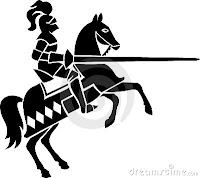 |
| Horseman image |
At Makkah, he stayed in the company of the Prophet and
gained knowledge and guidance. He returned to his country to propagate Islam afterwards, there was no news of him for more than a decade. Then just after the end of the Khaybar expedition he came to the Prophet in Madinah. His arrival there coincided with that of Jaffar ibn Abi Talib and other Muslims from Abyssinia and the Prophet welcomed them all with joy and happiness. This time Abu Musa did not come alone. He came with more than fifty persons from Yemen all of whom had accepted Islam. Among them were his two brothers, Abu Ruhm and Abu Burdah. The Prophet (SAW) referred to the whole group as the "Asharis". In fact he sometimes referred to all Yemenis as Asharis after Abu Musa al-Ashari. He often praised the group for their soft and tender-hearted nature and held them up to the rest of his companions as a high example of good behavior. He once said of them: "If the Asharis go on an expedition or if they only have a little food among them, they would gather all they have on one cloth and divide it equally among themselves. They are thus from me and I am from them."
Abu Musa soon became highly esteemed in the Muslim community. He was a faqih endowed with intelligence and sound judgement and was ranked as one of the leading judges in the early Muslim community. People used to say: "The judges in this ummah are four: Umar, Ali, Abu Musa and Zayd ibn Thabit." Abu Musa had a natural, uncomplicated disposition. In the field of jihad, he was a warrior of great courage and endurance and skill. The Prophet said of him: "The master of horsemen is Abu Musa." Abu Musa's insight and the soundness of his judgment did not allow him to be deceived by an enemy in battle. In battle conditions he saw situations with complete clarity and executed his actions with a firm resolve.
In spite of the fact that Abu Musa was a strong and powerful warrior, he often left the battlefield transformed into a penitent, weeping person. At such times, he would read the Quran in a voice that stirred the souls of all who listened to him. Umar (RA) often summoned Abu Musa and asked him to recite from the Book of ALLAH, saying: "Create in us a yearning for our Lord, O Abu Musa." When Umar sent Abu Musa to Basrah as governor, he called the inhabitants to a meeting and addressed them: "The Amir al-Muminin, Umar, has sent me to you to teach you the Book of your Lord and the Sunnah of His Prophet and to clean your streets for you." People were taken aback by these words. They could easily understand that one of the responsibilities of a Muslim ruler was to instruct people in their religion. However, that one of his duties should be to clean streets was something new and surprising to them.
The Prophet's grandson, al-Hasan (RA) said: "There was no rider who came to Basrah who was better for its people than he." Abu Musa was one of the few companions who had prepared a mushaf. Concerning his moving and melodious recitation of the Quran the Prophet (SAW) had said: "Abu Musa has indeed been given one of the flutes of the people of David." When fighting broke out among Muslims, he fled from such conflict and never took any part in it. Such was his stand in the conflict that arose between Ali and Muawiyah. It is in relation to this conflict and in particular his role as an adjudicator that the name of Abu Musa al-Ashari is most widely known.
Allah blessed Abu Musa’s family with sons, grandsons, and great grandsons who became renowned scholars, jurists or narrators of Hadith. Among his sons were Abu Burdah, Abu Bakr, Musa and `Abd al Rahman. Among his grandsons were Sa`eed ibn abi Bardah, Barrad ibn abi Bardah, Dhahhak ibn `Abd al Rahman, all of sound repute.
The last part of his blessed life was spent in Makkah Mukaramah near the sacred mosque. He became so attached to the Qur’an al-Karim, reading it, memorizing it, understanding it and acting upon it. When he began experiencing the signs of approaching death, he instructed the members of his family not to make public announcement of his demise, nor to wail loudly or burn frankincense. He instructed that he may be buried as fast as possible. He also instructed them not to build any memorial or tomb.
He passed away in 52 A.H, his advice regarding the Qur’an is full of wisdom. He said: “Follow the Qur’an and do not desire that the Qur’an should follow you”.
LESSONS
- We should not wish to be the only Muslims: After embracing Islam, Abu Musa wished for his people to also join the fold, he went back to his people and called them to the Deen.
- A leader should never be arrogant: Despite being a leader in Basra, Abu Musa never displayed any form of superiority towards his subjects.
- Being a warrior is not quintessential to being a monster: Abu Musa was strong in field of battle but his tender heart was not inclined to harshness.
- Avoid bloodshed among Muslims: Abu Musa must have had an idea regarding who was right and who wrong in the fracas that ensued between Ali and Muawiyya but he knew it involved Muslims spilling the blood of other Muslims; he kept his distance.



No comments:
Post a Comment
Tell us your opinion about this.